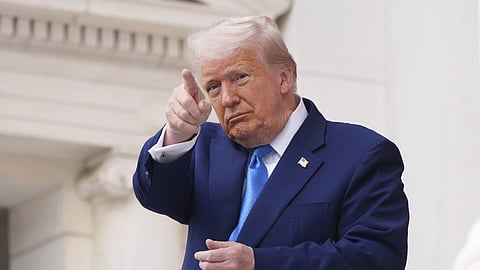

In the rarefied corridors of Raisina Hill, the mood has long been one of swaggering self-assurance. India the indispensable partner. The swing state of the 21st century. A democracy to check China, charm America, and still keep one foot in Moscow. But in the realm of geopolitics, self-mythology has a shelf life. And the music may be about to stop. The obvious harsh note came from US President Donald Trump’s Commerce Secretary, Don Lutnick, last week. He didn’t sugarcoat America’s irritation: “There are certain things that the Indian government does that generally rub the United States the wrong way. For instance, you generally buy your military gear from Russia. That’s a way to kind of get under the skin of America.” Lutnick took direct aim at India’s presence in BRICS. “That move to not support the dollar and dollar hegemony; it’s not really the way to make friends and influence people in America,” he said, sounding more like a threat than a warning. Trump’s Washington doesn’t care for strategic autonomy. It demands obedience; or it retaliates.
The Biden White House had looked the other way when India doubled down on discounted Russian oil; it accepted its opacity over Ukraine and New Delhi’s reluctance to condemn Putin—its military deals with Moscow were rationalised as legacies of the past, necessities of geography. Now MAGA expects allies to act as vassals. Operation Sindoor was expected to be a rallying point for international solidarity; instead it bought India little purchase. The quiet nudges and strategic winks that once accompanied its global assertiveness have vanished. Trump’s economic worldview is as transactional as his diplomacy. His tariffs threaten to undercut the Make in India initiative over Make in America worldview. In May, he told Tim Cook that he doesn’t want Apple building its products in India. American firms with global supply chains are being forced to reevaluate manufacturing partnerships. And the final insult: reports of the Trump family’s covert crypto deal with Pakistan’s military-linked fintech firms, potentially opening financial backdoors to the very groups India deems terror proxies. This is nothing short of geopolitical sabotage.
Amidst this chaos, Prime Minister Modi’s foreign policy team is beginning to look adrift. S Jaishankar, once hailed as the architect of India’s confident global stance, now finds himself presiding over its diplomatic contraction. The balance-of-power game he so carefully choreographed is collapsing under the weight of America’s unilateralism and its fatigue with India’s fence-sitting. Will Modi make a course correction and appoint a new UN-trained foreign minister to walk India out of this Trumpian geopolitical gutter?
A recalibration is essential—not just to salvage bilateral ties with the US, but to prevent India’s world stature from being sabotaged as an unreliable ally with too many allegiances and not enough friends. If India is to reclaim its global voice, it must abandon the illusion that being everywhere at once is the same as leading. Trump’s economic nationalism has turned into a direct assault on Indian manufacturing ambitions. Fresh tariffs on pharmaceuticals, electronics, and auto components—many of which form the bedrock of India’s export growth—are back on the table. The H-1B visa pipeline is narrowing. India still has leverage. Its economy, diaspora, and strategic geography still matter. But it must now act like a serious power by choosing sides when necessary, holding partners accountable, and recognising when the winds have changed. In Trump’s binary world, except for himself, there’s no room for gurus—only dealmakers, debtors, and those who know when to pick a side. Unilaterally.